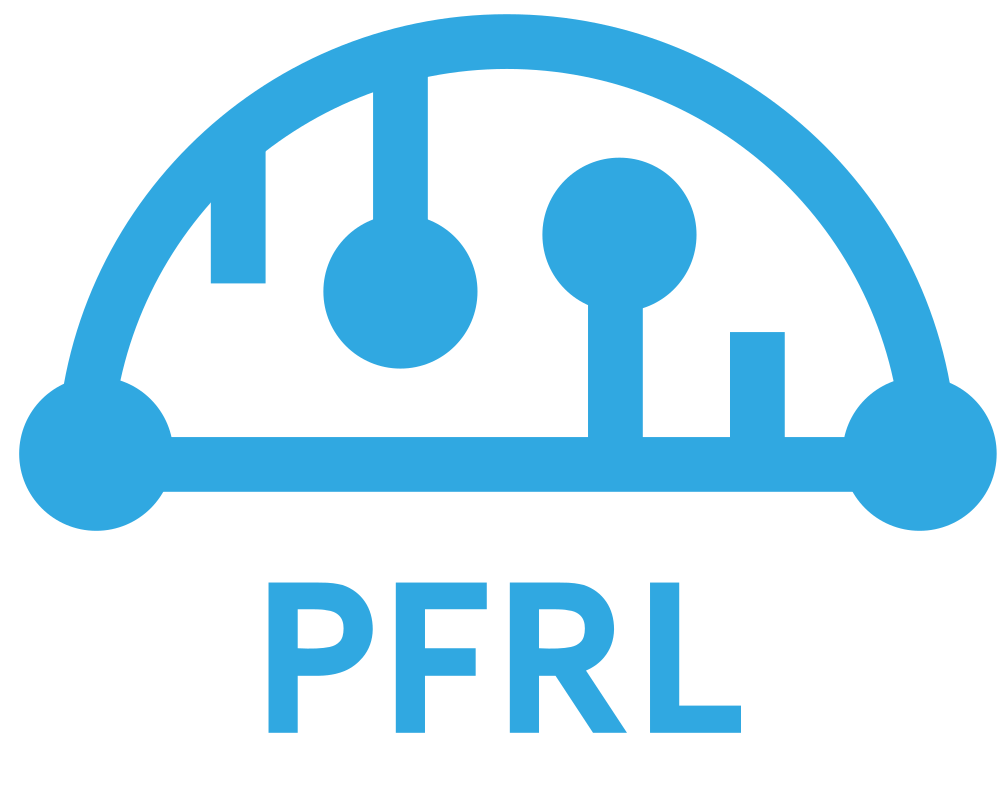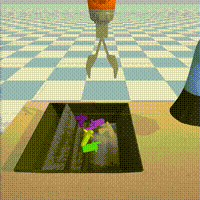PFRL is a deep reinforcement learning library that implements various state-of-the-art deep reinforcement algorithms in Python using PyTorch.
PFRL is tested with Python 3.7.7. For other requirements, see requirements.txt.
PFRL can be installed via PyPI:
pip install pfrl
It can also be installed from the source code:
python setup.py install
Refer to Installation for more information on installation.
You can try PFRL Quickstart Guide first, or check the examples ready for Atari 2600 and Open AI Gym.
For more information, you can refer to PFRL's documentation.
| Algorithm | Discrete Action | Continous Action | Recurrent Model | Batch Training | CPU Async Training | Pretrained models* |
|---|---|---|---|---|---|---|
| DQN (including DoubleDQN etc.) | ✓ | ✓ (NAF) | ✓ | ✓ | x | ✓ |
| Categorical DQN | ✓ | x | ✓ | ✓ | x | x |
| Rainbow | ✓ | x | ✓ | ✓ | x | ✓ |
| IQN | ✓ | x | ✓ | ✓ | x | ✓ |
| DDPG | x | ✓ | x | ✓ | x | ✓ |
| A3C | ✓ | ✓ | ✓ | ✓ (A2C) | ✓ | ✓ |
| ACER | ✓ | ✓ | ✓ | x | ✓ | x |
| PPO | ✓ | ✓ | ✓ | ✓ | x | ✓ |
| TRPO | ✓ | ✓ | ✓ | ✓ | x | ✓ |
| TD3 | x | ✓ | x | ✓ | x | ✓ |
| SAC | x | ✓ | x | ✓ | x | ✓ |
*Note on Pretrained models: PFRL provides pretrained models (sometimes called a 'model zoo') for our reproducibility scripts on Atari environments (DQN, IQN, Rainbow, and A3C) and Mujoco environments (DDPG, TRPO, PPO, TD3, SAC), for each benchmarked environment.
Following algorithms have been implemented in PFRL:
- A2C (Synchronous variant of A3C)
- examples: [atari (batched)]
- A3C (Asynchronous Advantage Actor-Critic)
- examples: [atari reproduction] [atari]
- ACER (Actor-Critic with Experience Replay)
- examples: [atari]
- Categorical DQN
- examples: [atari] [general gym]
- DQN (Deep Q-Network) (including Double DQN, Persistent Advantage Learning (PAL), Double PAL, Dynamic Policy Programming (DPP))
- DDPG (Deep Deterministic Policy Gradients) (including SVG(0))
- examples: [mujoco reproduction]
- IQN (Implicit Quantile Networks)
- examples: [atari reproduction]
- PPO (Proximal Policy Optimization)
- examples: [mujoco reproduction] [atari]
- Rainbow
- examples: [atari reproduction] [Slime volleyball]
- REINFORCE
- examples: [general gym]
- SAC (Soft Actor-Critic)
- examples: [mujoco reproduction] [Atlas walk]
- TRPO (Trust Region Policy Optimization) with GAE (Generalized Advantage Estimation)
- examples: [mujoco reproduction]
- TD3 (Twin Delayed Deep Deterministic policy gradient algorithm)
- examples: [mujoco reproduction]
Following useful techniques have been also implemented in PFRL:
- NoisyNet
- examples: [Rainbow] [DQN/DoubleDQN/PAL]
- Prioritized Experience Replay
- examples: [Rainbow] [DQN/DoubleDQN/PAL]
- Dueling Network
- examples: [Rainbow] [DQN/DoubleDQN/PAL]
- Normalized Advantage Function
- examples: [DQN] (for continuous-action envs only)
- Deep Recurrent Q-Network
- examples: [DQN]
Environments that support the subset of OpenAI Gym's interface (reset and step methods) can be used.
Any kind of contribution to PFRL would be highly appreciated! If you are interested in contributing to PFRL, please read CONTRIBUTING.md.
To cite PFRL in publications, please cite our paper on ChainerRL, the library on which PFRL is based:
@article{JMLR:v22:20-376,
author = {Yasuhiro Fujita and Prabhat Nagarajan and Toshiki Kataoka and Takahiro Ishikawa},
title = {ChainerRL: A Deep Reinforcement Learning Library},
journal = {Journal of Machine Learning Research},
year = {2021},
volume = {22},
number = {77},
pages = {1-14},
url = {http://jmlr.org/papers/v22/20-376.html}
}






